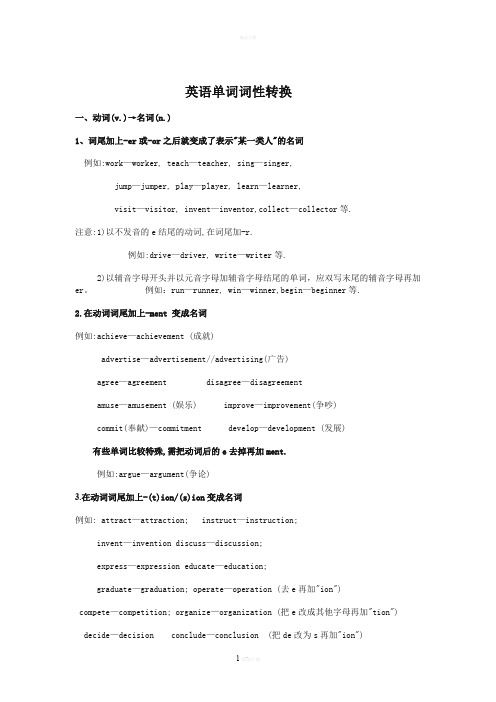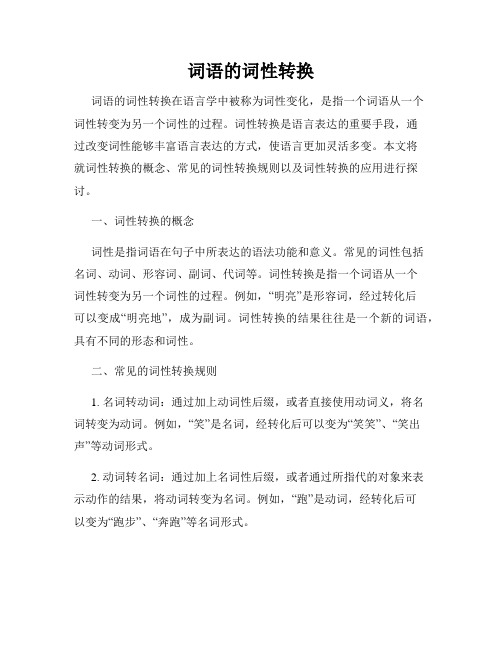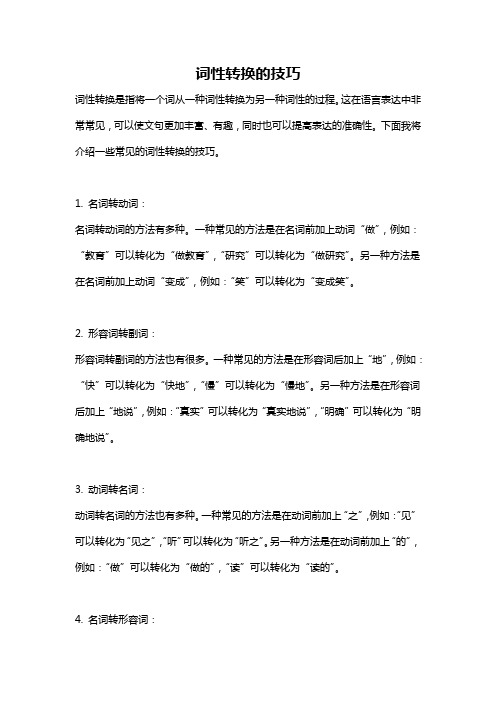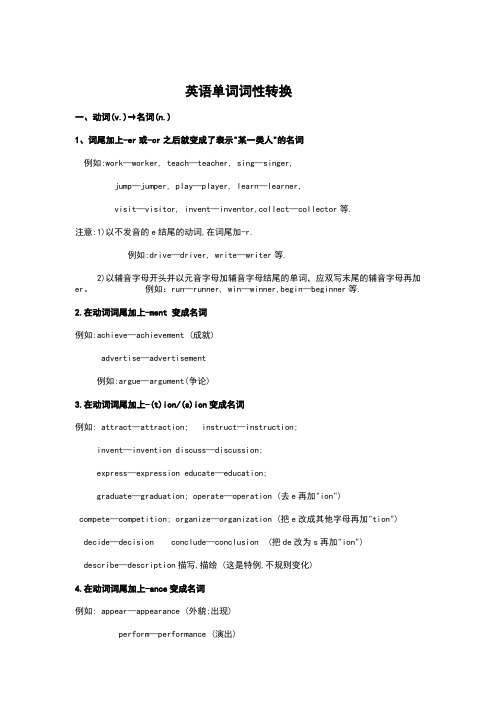词性转换
英语单词词性转换

英语单词词性转换一、动词(v.)→名词(n.)1、词尾加上-er或-or之后就变成了表示"某一类人"的名词例如:work—worker, teach—teacher, sing—singer,jump—jumper, play—player, learn—learner,visit—visitor, invent—inventor,collect—collector等.注意:1)以不发音的e结尾的动词,在词尾加-r.例如:drive—driver, write—writer等.2)以辅音字母开头并以元音字母加辅音字母结尾的单词,应双写末尾的辅音字母再加er。
例如:run—runner, win—winner,begin—beginner等.2.在动词词尾加上-ment 变成名词例如:achieve—achievement (成就)advertise—advertisement//advertising(广告)agree—agreement disagree—disagreementamuse—amusement (娱乐) improve—improvement(争吵)commit(奉献)—commitment develop—development (发展)有些单词比较特殊,需把动词后的e去掉再加ment.例如:argue—argument(争论)3.在动词词尾加上-(t)ion/(s)ion变成名词例如: attract—attraction; instruct—instruction;invent—invention discuss—discussion;express—expression educate—education;graduate—graduation; operate—operation (去e再加"ion")compete—competition; organize—organization (把e改成其他字母再加"tion")decide—decision conclude—conclusion (把de改为s再加"ion")describe—description描写,描绘 (这是特例,不规则变化)4.在动词词尾加上-ance变成名词例如: appear—appearance (外貌;出现)perform—performance (演出)accept—acceptance (接受)resist-resistance n.抵抗,阻力5.在动词词尾加-ing变成名词 (方法与动词变为现在分词的方法相同)例如:meet—meeting build—building wait—waitingbathe—bathing say—saying(谚语) mean—meaning注意:以辅音字母开头并以元音字母加辅音字母结尾的单词,应双写末尾的辅音字母再加-ing如:swim—swimming shop—shopping begin—beginning二、动词(v.)→形容词(adj.)1.动词后面加able,以e结尾的动词则去e加able,表示具有此性质,特点或属性.例如: afford-affordable;love-lovable2.动词后面加ed,以e结尾的动词则直接加d,表示被动性的属性或特点.例如: scatter-scattered use-used3不规则的动词则必须记忆,记住其过去分词形式.规律不大,意义同(b).三.名词(n.)→形容词(adj.)1.在名词后面加-y可以变成形容词(尤其是一些与天气有关的名词)例如: rain—rainy, cloud—cloudy, wind—windy, snow—snowy,health—healthy, luck—lucky,anger—angry guilt—guilty(内疚的)tourist—touristy(游客多的) , salt (盐)—salty (咸的)silk(丝绸)—silky(丝绸般的), sleep—sleepy (昏昏欲睡的)注意:1)如果以辅音字母开头并以元音字母加辅音字母结尾,这时应双写辅音字母再加"-y".如: sun—sunny, fun—funny, fog—foggy(有雾的), fur—furry(毛皮的)2)少数以不发音的e结尾的名词变为形容词时,应去掉e再加"-y".如: noise—noisy, ice—icy, shine—shiny(发亮的), taste(口味)—tasty(甜的) 2.名词后面加-ed,以e结尾的直接加d.例如: spot(斑点)—spotted(有斑点的); talent—talented (有天赋的)organize—organized 有组织的; balance—balanced(平衡的)3.一些抽象名词在词尾加-ful可以变为形容词例如:care—careful, thank—thankful, help—helpful,use—useful, meaning—meaningful4.在名词后加-less构成含有否定意义的形容词例如:care—careless(粗心的), use—useless(无用的)hope—hopeless(没希望的),home—homeless(无家可归的)5.一些以-ce结尾的名词,把-ce改为-t变成形容词例如: difference—different, silence—silent, confidence—confident6.在名词后加-ly变为形容词例如: friend—friendly, love—lovely, live---lively7.在名词后加-ous变为形容词例如: danger—dangerous prosperous a 繁荣的(pro 在前+sper 希望+ous)8.名词后面加-al变为形容词例如: music—musical; medicine—medical (这个比较特殊)9名词后面加-able变为形容词,如果以e结尾就去e再加"-able".例如: adjust—adjustable 可调整的 value—valuable有价值的10.名词后面加-en变成形容词例如: wood—wooden 木制的 wool—woolen 羊毛的四.形容词(adj.)→副词(adv.)▲一般在形容词的词尾加-ly可以变成副词例如: quick—quickly, slow—slowly, loud—loudly, sudden—suddenly 等例如:possible—possibly, terrible—terribly欢迎您的下载,资料仅供参考!致力为企业和个人提供合同协议,策划案计划书,学习资料等等打造全网一站式需求。
词汇学-词性转换法

02 应对四六级考试中词汇运用和语法结构的考察。
在翻译实践中的应用前景
通过词性转换法,准确传 达原文含义,保持译文流 畅自然。
丰富译文的表达方式和语 言风格,提高翻译质量。
应对不同语言间的词性差 异,提高翻译的灵活性和 准确性。
THANKS
感谢观看
副词转换为形容词
技巧:在副词后加上适当的形容词词 缀,如“-able”、“-ive”等,可以
将其转换为形容词。
"possible"原为副词,表示“可能 地”,去掉词缀“-ly”后变为形容词
"possible",表示“可能的”。
实例
"active"原为副词,表示“积极地”, 去掉词缀“-ly”后变为形容词 "active",表示“积极的、活跃的”。
形容词转换为副词
技巧:在形容词前加 上适当的副词词缀,
如“-ly”、“wise”等,可以将其
转换为副词。
实例
"quick"原为形容词, 表示“快速的”,加 上词缀“-ly”后变为 副词"quickly",表示
“快速地”。
"wise"原为形容词, 表示“明智的”,加 上词缀“-ly”后变为 副词"wisely",表示 “明智地、聪明地”。
动词转换为名词
技巧:在动词后加上适当的名词词缀,如“-tion”、 “-ment”、“-ance”等,可以将其转换为名词。
输标02入题
实例
01
03
"perform"原为动词,表示“表演、执行”,加上词 缀“-ance”后变为名词"performance",表示“表
词语的词性转换

词语的词性转换词语的词性转换在语言学中被称为词性变化,是指一个词语从一个词性转变为另一个词性的过程。
词性转换是语言表达的重要手段,通过改变词性能够丰富语言表达的方式,使语言更加灵活多变。
本文将就词性转换的概念、常见的词性转换规则以及词性转换的应用进行探讨。
一、词性转换的概念词性是指词语在句子中所表达的语法功能和意义。
常见的词性包括名词、动词、形容词、副词、代词等。
词性转换是指一个词语从一个词性转变为另一个词性的过程。
例如,“明亮”是形容词,经过转化后可以变成“明亮地”,成为副词。
词性转换的结果往往是一个新的词语,具有不同的形态和词性。
二、常见的词性转换规则1. 名词转动词:通过加上动词性后缀,或者直接使用动词义,将名词转变为动词。
例如,“笑”是名词,经转化后可以变为“笑笑”、“笑出声”等动词形式。
2. 动词转名词:通过加上名词性后缀,或者通过所指代的对象来表示动作的结果,将动词转变为名词。
例如,“跑”是动词,经转化后可以变为“跑步”、“奔跑”等名词形式。
3. 形容词转副词:通过加上副词性后缀,或者去掉形容词的形容功能,使其表达修饰动作、程度、方式等意义的副词。
例如,“高兴”是形容词,经转化后可以变为“高兴地”、“欢乐地”等副词形式。
4. 副词转形容词:通过加上形容词性后缀,或者通过表示程度的副词来表示一种性质或状态,将副词转变为形容词。
例如,“迅速”是副词,经转化后可以变为“迅速的”、“快速的”等形容词形式。
三、词性转换的应用1. 丰富词语的表达:通过词性转换可以丰富词语的表达方式,使句子更加生动有趣。
例如,“飞”(动词)可以转化为“飞行”(名词),以扩展其表达范围。
2. 增强修饰手段:通过将形容词转化为副词,可以更准确地表达出动作的方式、程度等。
例如,“快”(形容词)可以转化为“快速地”(副词),表示动作的速度或方式。
3. 提高句子的连贯性:通过词性转换,可以使词语在句子中的词性统一,增强句子的连贯性。
词性转换

词性转换Danger N→ dangerous Adj 危险的Fun N → funny Adj 有趣的Africa → African 非洲人的America → American 美国的Asia→ Asian 亚洲的Europe →European 欧洲的Health健康→ healthy 健康的Beauty 美丽→beautiful 美丽的Luck →lucky幸运的反义词unlucky Tradition → t raditional 传统的Use V→ useful 有用的AdjHelpV → helpful 有助的,有益的AdjHappy→ 反义词:unhappy Expensive=dear → 反义词:cheap strange:奇怪的Adj → stranger:陌生人Nworry: 担心V→worried: 担心的Adjcheer: 为……喝彩V →cheerful: 快乐的,愉快的Adjwin:赢V→ winner:胜利者Nrain N → ra iny Adjtour旅行→tourist游客/tourism 旅游业succeed V→ success N →successful Adj die V→ dead Adj → death N 死亡marry V →married Adj 结婚的relax V → relaxed/ relaxing Adj 放松的,轻松的noise N → noisy Adj 喧闹的visit V → visitor N 拜访者gold N→ golden Adj 金色的write V → writ er N 作家build V → building N 建筑物Germany N → German Adj 德国人的Health N——healthy Adj —— healthily Adv—— unhealthy 反义词mean V →meaning N 意思,含义advise V →advice N 建议practise V →practice N 练习pronounce V →pronunciation N 发音suggest V →suggestion N 建议possible Adj →impossible →possibility N 可能性choose V →choice N 选择nature N → natural Adj 自然的culture N →cultural Adj 文化的difficult Adj → difficulty N 困难important Adj → importance N 重要性confident Adj → confidence N 自信silent Adj → silence N 沉默different Adj →diffe rence N 差异appear V →appearance N 外貌,露面enjoy V →enjoyable Adj 快乐的,令人愉快的invite V → invitation N 邀请comfort N → comfortable Adj 舒适的widen V →wide Adj→ width N 宽度deepen V →deep Adj→depth N 深度east/west/north/southN→east ern/west ern Adjcareful →careles s 粗心的close V →closed Adj 关闭的crowd N → crowded Adj 拥挤的actress →actor 女演员/男演员nation N →national Adj 国家的,民族的tradition N →traditional Adj 传统的land V → landing N 登入solve V → solution N 解决方案peace N →peaceful Adj 和平的produce V → production N 生产medicine N →medical Adj 医疗的taste V →tasty Adj 好吃的salt N →salty Adj 咸的surprise N →surprised/surprising Adj 令人感到奇怪的cloud/wind/rain/snow/sun N →cloud y/wind y/rain y/snow y/sun ny Adj show V →shower N 阵雨protect V →protection N 保护discuss V →discussion Nproud Adj → prid e N 骄傲strange Adj → stranger N 陌生人interest N→ interested/interesting Adj invent V→ invention N 发明Germany N→ Germans 德国人/德国的West N→western Adj 西方的Cook V→ cook 厨师cooker 厨具N Possible → impossible 反义词不可能Communicate V→ communication N 交流Explain V→ explanation N 解释,说明Introduce V→ introduction N 介绍Expect V→ expectation N Environment N →Environmental Adj 环境的Nation N→ national Adj国家的Culture N→ cultural Adj 文化的Centre N→central Adj 中心的Ill N→ illness N 疾病Sleep V→ Adj sleepy 困的,恹恹欲睡的sleeping /asleep 睡着的Weak Adj → weakness N 虚弱的Humor N→ humorous Adj 幽默的Satisfy V→ Adj satisfied 满意的Noise N→ noisy Adj 吵闹的,喧哗的Value N→ valuable Adj 有价值的Success N→ successful Adj →V succeed 成功Pleasure N→ pleased(主语是“人”高兴的,满意地/ pleasant(主语是“物”使人感到高兴,愉快AdjWeigh V→ weight N体重Short Adj → shorts N 短裤Thirst N→ thirsty Adj 口渴得late Adj → latest 最近的develop V→ developing/developed 发展中/发达国家→developmentpass V→ past过去的Adj→Adv 经过Wake V→ awake N 醒着的Lone 孤独的,无伴的,孤零零的Lonely 情感上的孤单Alone 独自Silence N→ silent Adj 安静的Avoid V → avoidable → avoidance 避免NMarry V → marriage N 婚姻Present V → presenter N 主持人interview V → interviewee 被面试的人/interviewer 面试的人die V → dying 垂死的,即将要死的dead 死了的Adj→ death NLove V→lovely 可爱的Adj loving 慈祥的Decide V→ decision N 决定Own V→owner N 主人Satisfy V→ satisfied Adj→ satisfaction N 满足Excited Adj→ excitement N 激动Broke V→ broken Adj 破碎的Kind Adj→ kindness N 仁慈,好意Fair Adj→ unfair 不公平Ice N→ iced Adj 结冰的Old → elder=older 年长的Kid N→ kidding 玩笑True Adj→ truth N 真理,真相Achieve V →achievement N 成就Keep V →keeper N 看守人,保安,饲养人Remain V → remaining Adj 剩余的Independent Adj → independence N 独立。
词性转换的技巧

词性转换的技巧词性转换是指将一个词从一种词性转换为另一种词性的过程。
这在语言表达中非常常见,可以使文句更加丰富、有趣,同时也可以提高表达的准确性。
下面我将介绍一些常见的词性转换的技巧。
1. 名词转动词:名词转动词的方法有多种。
一种常见的方法是在名词前加上动词“做”,例如:“教育”可以转化为“做教育”,“研究”可以转化为“做研究”。
另一种方法是在名词前加上动词“变成”,例如:“笑”可以转化为“变成笑”。
2. 形容词转副词:形容词转副词的方法也有很多。
一种常见的方法是在形容词后加上“地”,例如:“快”可以转化为“快地”,“慢”可以转化为“慢地”。
另一种方法是在形容词后加上“地说”,例如:“真实”可以转化为“真实地说”,“明确”可以转化为“明确地说”。
3. 动词转名词:动词转名词的方法也有多种。
一种常见的方法是在动词前加上“之”,例如:“见”可以转化为“见之”,“听”可以转化为“听之”。
另一种方法是在动词前加上“的”,例如:“做”可以转化为“做的”,“读”可以转化为“读的”。
4. 名词转形容词:名词转形容词的方法有多种。
一种常见的方法是在名词后加上“的”,例如:“困难”可以转化为“困难的”,“美丽”可以转化为“美丽的”。
另一种方法是在名词前加上“具有”,例如:“价值”可以转化为“具有价值的”,“特点”可以转化为“具有特点的”。
5. 副词转动词:副词转动词的方法也有多种。
一种常见的方法是在副词后加上动词“做”,例如:“迅速”可以转化为“迅速做”,“安静”可以转化为“安静做”。
另一种方法是在副词后加上动词“变成”,例如:“成形”可以转化为“变成成形”,“明亮”可以转化为“变成明亮”。
6. 状语转形容词:状语转形容词的方法也有多种。
一种常见的方法是在状语前加上形容词“是”,例如:“完全”可以转化为“是完全的”,“不可避免”可以转化为“是不可避免的”。
另一种方法是在状语前加上形容词“之”,例如:“明显”可以转化为“之明显”,“难以置信”可以转化为“之难以置信”。
英语单词词性转换

英语单词词性转换一、动词v.→名词n.1、词尾加上-er或-or之后就变成了表示"某一类人"的名词例如:work—worker, teach—teacher, sing—singer,jump—jumper, play—player, learn—learner,visit—visitor, invent—inventor,collect—collector等.注意:1以不发音的e结尾的动词,在词尾加-r.例如:drive—driver, write—writer等.2以辅音字母开头并以元音字母加辅音字母结尾的单词,应双写末尾的辅音字母再加er; 例如:run—runner, win—winner,begin—beginner等.2.在动词词尾加上-ment 变成名词例如:achieve—achievement 成就advertise—advertisement例如:argue—argument争论3.在动词词尾加上-tion/sion变成名词例如: attract—attraction; instruct—instruction;invent—invention discuss—discussion;express—expression educate—education;graduate—graduation; operate—operation 去e再加"ion"compete—competition; organize—organization 把e改成其他字母再加"tion"decide—decision conclude—conclusion 把de改为s再加"ion"describe—description描写,描绘这是特例,不规则变化4.在动词词尾加上-ance变成名词例如: appear—appearance 外貌;出现perform—performance 演出accept—acceptance 接受resist-resistance n.抵抗,阻力5.在动词词尾加-ing变成名词方法与动词变为现在分词的方法相同例如:meet—meeting build—building wait—waitingbathe—bathing say—saying谚语 mean—meaning注意:以辅音字母开头并以元音字母加辅音字母结尾的单词,应双写末尾的辅音字母再加-ing 如:swim—swimming shop—shopping begin—beginning二、动词v.→形容词adj.1.动词后面加able,以e结尾的动词则去e加able,表示具有此性质,特点或属性.例如: afford-affordable;love-lovable2.动词后面加ed,以e结尾的动词则直接加d,表示被动性的属性或特点.例如: scatter-scattered use-used3不规则的动词则必须记忆,记住其过去分词形式.规律不大,意义同b.三.名词n.→形容词adj.1.在名词后面加-y可以变成形容词尤其是一些与天气有关的名词例如: rain—rainy, cloud—cloudy, wind—windy, snow—snowy,health—healthy, luck—lucky,anger—angry guilt—guilty内疚的tourist—touristy游客多的 , salt 盐—salty 咸的silk丝绸—silky丝绸般的, sleep—sleepy 昏昏欲睡的注意:1如果以辅音字母开头并以元音字母加辅音字母结尾,这时应双写辅音字母再加"-y".如: sun—sunny, fun—funny, fog—foggy有雾的, fur—furry毛皮的2少数以不发音的e结尾的名词变为形容词时,应去掉e再加"-y".如: noise—noisy, ice—icy, shine—shiny发亮的, taste口味—tasty甜的2.名词后面加-ed,以e结尾的直接加d.例如: spot斑点—spotted有斑点的; talent—talented 有天赋的organize—organized 有组织的; balance—balanced平衡的3.一些抽象名词在词尾加-ful可以变为形容词例如:care—careful, thank—thankful, help—helpful,use—useful, meaning—meaningful4.在名词后加-less构成含有否定意义的形容词例如:care—careless粗心的, use—useless无用的hope—hopeless没希望的,home—homeless无家可归的5.一些以-ce结尾的名词,把-ce改为-t变成形容词例如: difference—different, silence—silent, confidence—confident 6.在名词后加-ly变为形容词例如: friend—friendly, love—lovely, live---lively7.在名词后加-ous变为形容词例如: danger—dangerous prosperous a 繁荣的pro 在前+sper 希望+ous 8.名词后面加-al变为形容词例如: music—musical; medicine—medical 这个比较特殊9名词后面加-able变为形容词,如果以e结尾就去e再加"-able".例如: adjust—adjustable 可调整的 value—valuable有价值的10.名词后面加-en变成形容词例如: wood—wooden 木制的 wool—woolen 羊毛的四.形容词adj.→副词adv.▲一般在形容词的词尾加-ly可以变成副词例如: quick—quickly, slow—slowly, loud—loudly, sudden—suddenly 等例如:possible—possibly, terrible—terribly。
英语单词词性转换

英语单词词性转换一、动词(v.)→名词(n.)1、词尾加上-er或-or之后就变成了表示"某一类人"的名词例如:work—worker, teach—teacher, sing—singer,jump—jumper, play—player, learn—learner,visit—visitor, invent—inventor,collect—collector等.注意:1)以不发音的e结尾的动词,在词尾加-r.例如:drive—driver, write—writer等.2)以辅音字母开头并以元音字母加辅音字母结尾的单词,应双写末尾的辅音字母再加er。
例如:run—runner, win—winner,begin—beginner等.2.在动词词尾加上-ment 变成名词例如:achieve—achievement (成就)advertise—advertisement例如:argue—argument(争论)3.在动词词尾加上-(t)ion/(s)ion变成名词例如: attract—attraction; instruct—instruction;invent—invention discuss—discussion;express—expression educate—education;graduate—graduation; operate—operation (去e再加"ion")compete—competition; organize—organization (把e改成其他字母再加"tion")decide—decision conclude—conclusion (把de改为s再加"ion")describe—description描写,描绘 (这是特例,不规则变化)4.在动词词尾加上-ance变成名词例如: appear—appearance (外貌;出现)perform—performance (演出)accept—acceptance (接受)resist-resistance n.抵抗,阻力5.在动词词尾加-ing变成名词 (方法与动词变为现在分词的方法相同)例如:meet—meeting build—building wait—waitingbathe—bathing say—saying(谚语) mean—meaning注意:以辅音字母开头并以元音字母加辅音字母结尾的单词,应双写末尾的辅音字母再加-ing如:swim—swimming shop—shopping begin—beginning二、动词(v.)→形容词(adj.)1.动词后面加able,以e结尾的动词则去e加able,表示具有此性质,特点或属性.例如: afford-affordable;love-lovable2.动词后面加ed,以e结尾的动词则直接加d,表示被动性的属性或特点.例如: scatter-scattered use-used3不规则的动词则必须记忆,记住其过去分词形式.规律不大,意义同(b).三.名词(n.)→形容词(adj.)1.在名词后面加-y可以变成形容词(尤其是一些与天气有关的名词)例如: rain—rainy, cloud—cloudy, wind—windy, snow—snowy,health—healthy, luck—lucky,anger—angry guilt—guilty(内疚的)tourist—touristy(游客多的) , salt (盐)—salty (咸的)silk(丝绸)—silky(丝绸般的), sleep—sleepy (昏昏欲睡的)注意:1)如果以辅音字母开头并以元音字母加辅音字母结尾,这时应双写辅音字母再加"-y".如: sun—sunny, fun—funny, fog—foggy(有雾的), fur—furry(毛皮的)2)少数以不发音的e结尾的名词变为形容词时,应去掉e再加"-y".如: noise—noisy, ice—icy, shine—shiny(发亮的), taste(口味)—tasty(甜的) 2.名词后面加-ed,以e结尾的直接加d.例如: spot(斑点)—spotted(有斑点的); talent—talented (有天赋的)organize—organized 有组织的; balance—balanced(平衡的)3.一些抽象名词在词尾加-ful可以变为形容词例如:care—careful, thank—thankful, help—helpful,use—useful, meaning—meaningful4.在名词后加-less构成含有否定意义的形容词例如:care—careless(粗心的), use—useless(无用的)hope—hopeless(没希望的),home—homeless(无家可归的)5.一些以-ce结尾的名词,把-ce改为-t变成形容词例如: difference—different, silence—silent, confidence—confident6.在名词后加-ly变为形容词例如: friend—friendly, love—lovely, live---lively7.在名词后加-ous变为形容词例如: danger—dangerous prosperous a 繁荣的(pro 在前+sper 希望+ous)8.名词后面加-al变为形容词例如: music—musical; medicine—medical (这个比较特殊)9名词后面加-able变为形容词,如果以e结尾就去e再加"-able".例如: adjust—adjustable 可调整的 value—valuable有价值的10.名词后面加-en变成形容词例如: wood—wooden 木制的 wool—woolen 羊毛的四.形容词(adj.)→副词(adv.)▲一般在形容词的词尾加-ly可以变成副词例如: quick—quickly, slow—slowly, loud—loudly, sudden—suddenly 等例如:possible—possibly, terrible—terribly。
词性转换规律

词类转换分类记忆I.形容词——副词1、加lyquiet安静的quick 快速的slow慢的beautiful美丽的bright明亮的careful仔细的certain一定的clear清楚的loud大声的sad难过的wide广泛的serious严重的usual通常final最后的safe安全的real真的的recent最近的main主要的accurate精确的2、去y加ilyeasy容易的heavy大量angry生气的hungry饥饿的happy 快乐的lucky幸运的3、le结尾的,去e变ypossible可能gentle轻柔的4、不变hard难的;努力地,猛烈地fast快early早late晚enough足够straight笔直II. 动词——名词1、加er、or、ress加erfarm 耕种—farmer农民drive 驾驶—driver驾驶员teach 教—teacher老师work 工作—worker工人write 写—writer作家report 报道—reporter记者win 赢—winner获胜者own 拥有—owner拥有者paint画、粉刷---painter画家manage 经营—manager经理record记录—recorder录音机加oract--actor 男演员visit—visitor观光者invent--inventor 发明家calculate—calculator计算器edit – editor 编辑sail ---sailor 水手加resswait—waitress女服务员act—actress女演员2、加ion结尾add—add i tion 加collect—collection 收集discuss—discussion讨论decide—decision决定invent—invention发明物invite—invitation 邀请operate—operation手术pollute—pollution 污染review—revision 复习solve—solution解答organize—organization组织locate—location地点suggest—suggestion建议protect---protection 保护3、加ingbegin—begi nn ing开始build—building大楼say—saying 谚语paint—painting 绘画meet—meeting 会议end —ending4、其他serve—service 服务speak—speech 演讲、言语fish—fisherman 渔夫enter—entrance 入口know—knowledge 知识weigh—weight 重量please—pleasure 愉快develop—development 发展choose—choice选择tour—tourist 游客die—death 死亡succeed—success 成功fly—flight 飞行、航班memorize—memory 记忆mix—mixture 混合物cook—cook 厨师save—safety 安全act—activity 活动able—ability 能力III. 名词——名词art艺术—artist画家science—scientist 科学家city—citizen市民custom—customer 顾客office—officer 官员engine—engineer工程师friend—friendship 友谊business—businessman男商人business—businesswoman女商人law法律—lawyer律师IV. 名词——形容词1、名词后加fulcare—careful 小心的use—useful 有用的help—helpful有帮助的thank—thankful 感激的wonder—wonderful精彩的power—powerful 强大的harm—harmful 有害的2、名词后加ycloud—cloudy 多云的rain—rainy 下雨的wind—windy 有风的snow—snowy 下雪的sun—su nn y 晴朗的noise—noisy 吵闹的health—healthy 健康的fun—funny 滑稽的luck—lucky 幸运的3、名词后加lyfriend—friendly 友好的love—lovely 可爱的4、形容词以al 结尾nation—national 国家的education--educational 教育的nature—natural 自然的tradition—traditional 传统的medicine—medical 医药的physics—physical 物理的chemistry—chemical化学的history—historical 历史的5、名词末尾的ce变成tdifference(s)—different 不同importance—important 重要的6、名词后加enwood—wooden木制的gold—golden金色的(wool—woolen 羊毛的)7、名词以ness结尾kindness仁慈—kind仁慈的illness病疾病--- ill有病的不健康8、形容词后加y difficult—difficulty 困难honest—honesty诚实9、形容词后加dom free—freedom 自由wise—wisdom 聪明10、其他danger—dangerous 危险的office—official 官方的、正式的fool傻瓜—foolish 愚蠢的west—western 西方的height高度— high高的length长度—long 长的favour恩惠—favourite 最喜欢的foreigner外国人foreign 外国的home家—homeless 无家可归的expense费用—expensive昂贵的truth真相—true 真实的wound创伤—wounded受伤的pleasure—pleasant 令人愉快的/ pleased 满意的response相应反映--- responsible 负责的有责任的electricity电—electric电的—electronic 电子的V. 动词——形容词interest引起兴趣—interesting 有趣的/ interested 感兴趣的excite—exciting 令人激动的/ excited激动的freeze—freezing 寒冷的/ frozen 冷冻的frighten—frightening 令人害怕的/ frightened害怕的forget—forgetful健忘的/ unforgettable 难忘的depend—independent 独立的有主见的like—likely很有可能发生的有希望的realize意识到—real 真的break—broken 碎的follow—following 下面的fill—full 满的、饱的enjoy—enjoyable使人愉快的change—changeable 多变的act—active 积极的attract—attractive 吸引人的die—dead 死的widen拓宽—wide 宽的live—alive活的VI. 前缀possible—impossible (polite, patient)可能—不可能tell—retell说—复述build—rebuild 建造—重建healthy—unhealthy健康的—不健康的honest—dishonest诚实—不诚实的appear—disappear出现—消失like—dislike 喜欢—不喜欢VII. 国名——国籍Australia—Australian America—American Canada—Canadian Britain—British England—English Italy—Italian China—Chinese Japan—JapaneseGermany—German (德国人复数German s)。
- 1、下载文档前请自行甄别文档内容的完整性,平台不提供额外的编辑、内容补充、找答案等附加服务。
- 2、"仅部分预览"的文档,不可在线预览部分如存在完整性等问题,可反馈申请退款(可完整预览的文档不适用该条件!)。
- 3、如文档侵犯您的权益,请联系客服反馈,我们会尽快为您处理(人工客服工作时间:9:00-18:30)。
英语里通过加后缀来改变词性。
①常见的名词后缀有:-er thinker, teacher, driver(动词变名词) -or actor, visitor, conductor(动词变名词)-ist scientist, artist, chemist, terrorist(没变)-ian musician, mathematician(没变)-ese Chinese, Japanese (没变)-ness happiness, kindness, usefulness(形容词变名词)-tion preparation, education, communication(动词变名词)-ment movement, development, improvement(动词变名词)-ion discussion, commission, television(动词变名词)-ship friendship, hardship(名词、副词变名词)-hood childhood, boyhood(没变)-dom freedom, kingdom(形容词、名词变名词)-th truth, length, width(形容词变名词)②常见的动词后缀有-ize realize, modernize, apologize(形容词或名词变为动词)-en widen, shorten, deepen(形容词变为动词)③常见的形容词后缀有-ful useful, careful, wonderful(动词变形容词)-less careless, useless, helpless(动词变形容词)-ous dangerous, curious好奇的(名词变为形容词)-ly friendly, lovely (名词或动词变为形容词)-y rainy, sunny, snowy(动词变为形容词)-able comfortable, acceptable (动词或名词变为形容词)动词变成名词后一般会有这几种类型:1.名词和动词同形:比较容易理解,这类词也比较多,如:care,既可做动词, 意为:关心,担心,也可以当名词,意为:当心,小心,注意。
certificate,既可做动词,意为:用证书证明(认可),也可以当名词,意为:证明书,执照。
2.表示动作结果:换言之,就是与这个动作相应的行为产生的条件的具体反应。
如LZ所提的动词:provide(提供),provision(供应, 供给)这一类一般有如下两个小分类:A:一般以-t, -s, -se, -l, -n结尾的动词,构成名词时可以加-s(t)ure, 一般具有抽象意义,如:Depart(离去)v.-departure(离开)n. Fail(失败)v.-failure(失败)n. Press(压)v.-pressure(压力)n.B:一般以-te, -de, -se. –ze,–ct.等结尾的动词,构成名词时可以加-ion,如:Invite(邀请)v.-invitation(请帖)n. Protect(保护)v.-protection(保护)n.Extend(伸展)v.-extension(伸张)n.3.表示动作执行者(施事):这个形式较为单一,一般只有加后缀-er(-eer, -ier) 或-or(-our),-ant,如:lead(领导)v.-leader(领导人)n. murder(谋杀)v.-murderer(谋杀者)n.engine (引擎)v.-engineer(技师)n.或:counsel(劝告)v.-counsel(l)or(顾问)n.govern(统治)v.-governor(统治者)n.或:assist(帮助)v.-assistant(助手)n.serve(服务)v.-servant(仆人)n.4.表示动作被执行者(受事):这一类型较为常见的是后缀:-ee, 如:employ(雇用)v. -employee(雇员)n. examine(检查)v. -examinee(考生)n.5.表示动作的抽象意义:一般只有具有抽象意义的动词,才能使用这种方法,构成名词,如:fulfill(履行)v.-fulfil(l)ment(实现)n. judge(判断)v.-judg(e)ment(审判)n.move(移动)v.-movement(运动)n. treat(对待)v.-treatment(待遇)n.英语动词变形容词有什么规律第一,后面加able,afford-affordable;以e结尾的动词则去e加able,love-lovable:表示具有此性质、特点或属性。
第二,后面加ed,scatter-scattered;以e结尾的动词则直接加d,use-used:表示被动性的属性或特点。
第三,不规则的动词则必须记忆,记住其过去分词形式规律不大,意义同上。
第四,后面加ing,run-running,die-dying,变为现在分词形式,有的去e加ing,有的双写加ing,有的改为y加ing,规律同现在分词,表示有正在主动的进行的属性或特点。
动词变形容词类:1. 在动词后加后缀-ful, 如:care→careful; use→useful; thank→thankful; help→helpful;wonder→wonderful forget→forgetful2.后加ED/ING等。
如:INTEREST - --INTERESTED WOUND - --WOUNDED在原动词后加-ive; -able( 标有能力……) ; -ary ; -al -ed(表被动)-ous -ior动词变名词:1.在词尾加er,r ,双写加er 或or:A. play -player, sing -singer, wait - waiter , find-finder,B. write - writer, drive - driver, come - comer, explore -explorerdance- dancerC. run -runner, win- winner, rob -robber, travel - travellerD. visit -visitor, invent -inventor2. 在词尾加ing:build -building, draw -drawing, end -ending, begin -beginning,swim -swimming,skate-skating, feel -feeling, say -saying,mean - meaning, cross- crossing,surf- surfing, paint -painting3.在词尾加ion 或去e加ion:A. decide - decision, describe -description, produce- production,celebrate- celebration,pronounce-pronunciation, decorate - decorationgraduate -graduation,frustrate- frustration,pollute- pollutioncontribute -contribution, congratulate -congratulation,educate - education,organize- orgnization,donate- donation,appreciate - appreciation,operate -operation, invite- invitationB. discuss -discussion, invent -invention, attract -attractionimpress -impression,inject - injection,instruct- instruction4.其它:know -knowledge, please-pleasure, enjoy- enjoyment,practise -practice,die-death, succeed -success, weigh -weight,sit -deat, change -chance,enter -entrance,fly - flight,rob -robbery, discover -discovery,faile- failure,appear -appearance,breathe -breath1. The Chinese people are very_________(friend) to foreigners.2. I want to know how to eat and drink __________. (health)3. Crying for things you can't have is __________. (child)4. The ________(watch) are Lily and Lucy’s.5. I think it'll be_________(sun) tomorrow afternoon.6. He has gone to the ________(teachers) office.7. The doctor tried h is best to save many people’s _________(life).8. We can see many_________(sheep) in the Australian farm.9. The doctor will ___________(operation) on her leg tomorrow.10. Tim did badly in the exam. John did even ______(badly).11. What kind of meat is ________(popular) in China, pork, beef or chicken?12. Are your parents _________(interesting) in swimming?13. English is __________(wide) used all over the world.14. I am ill. I feel very ___________(comfortable).15. I have a friend from Korea._________(he) name is Jim.16. They did all the work by________(they).17. The professor will give __________(they) a talk the day after tomorrow.18. We really enjoyed _________(we) during our stay in Beijing.19. A friend of __________(I) will come to our school next Friday.20. I'm sorry to keep you_________(wait).21. Edison was one of the greatest __________ in the world. (invent)22. Can't you hear them_________(sing) in the classroom?24. Have they finished the_________(operate)?25. Can you tell him_________(call) me this afternoon?26. Her aunt is a famous _________(dance) in our country.27. The Yellow River is the_________(two) longest river in China.28. Two _________(three) of the students in our class are good at English.29. The Olympic Games are held every _________(fourth)years.30. There are about five __________(hundred) boy students in our school.31. May is _________(one) student to work out the difficult problem.32. They saw_________(thousand) of birds in the forest.。
